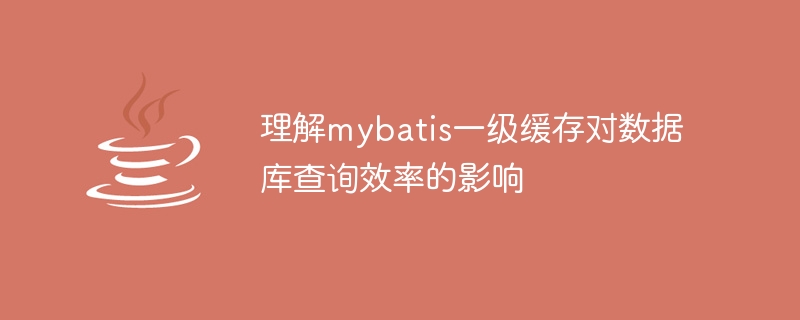Home >Java >javaTutorial >Study the impact of mybatis first-level cache on database query efficiency
Study the impact of mybatis first-level cache on database query efficiency
- WBOYOriginal
- 2024-02-19 18:40:08734browse

Understanding the impact of MyBatis first-level cache on database query efficiency requires specific code examples
In modern software development, database query is a very common operation. In order to improve query efficiency, many frameworks provide caching functions. As a popular Java persistence layer framework, MyBatis also provides first-level cache to improve database query efficiency. It is very important for developers to understand and understand the impact of MyBatis first-level cache on database query efficiency.
First of all, we need to understand what MyBatis first-level cache is. MyBatis first-level cache means that within the same SqlSession object, for the same query statement, MyBatis will cache the results of the first query. When the same query statement is executed again, MyBatis will obtain the results directly from the cache without the need to initiate a query request to the database again. This caching mechanism can significantly improve query efficiency.
Next, we use specific code examples to illustrate the impact of first-level cache on database query efficiency.
// 定义一个UserMapper接口
public interface UserMapper {
User selectUserById(int id);
}
// 编写MyBatis的Mapper.xml配置文件,实现查询语句
<select id="selectUserById" resultType="User">
SELECT * FROM user WHERE id = #{id}
</select>
// 使用MyBatis查询用户信息
SqlSessionFactory sqlSessionFactory = new SqlSessionFactoryBuilder().build(reader);
SqlSession sqlSession = sqlSessionFactory.openSession();
UserMapper userMapper = sqlSession.getMapper(UserMapper.class);
// 第一次查询用户信息
User user1 = userMapper.selectUserById(1);
System.out.println(user1);
// 第二次查询用户信息,此时会直接从一级缓存中获取结果
User user2 = userMapper.selectUserById(1);
System.out.println(user2);
In the above code example, we first create a SqlSessionFactory object and then open a SqlSession object through it. Next, we use the SqlSession object to obtain the proxy object of the UserMapper interface and call the method to query.
When querying user information for the first time, MyBatis will cache the query results into the first-level cache. When querying the same user information for the second time, MyBatis will obtain the results directly from the first-level cache without the need to initiate a query request to the database again. This greatly improves query efficiency.
It should be noted that the effective range of the first-level cache is within the same SqlSession object. Once the SqlSession object is closed or the transaction is committed, the first-level cache will be invalidated. Therefore, if we execute the same query statement in different SqlSession objects, MyBatis will reinitiate the query request without using the first-level cache.
In actual development, reasonable use of MyBatis's first-level cache can effectively improve database query efficiency. However, the first-level cache may also bring some potential problems, such as data consistency issues. In scenarios where we need to obtain the latest data in a timely manner, we can solve the problem by manually clearing the cache.
In summary, understanding the impact of MyBatis first-level cache on database query efficiency requires specific code examples. Through the sample code, we can clearly see how the first-level cache improves query efficiency, and understand the limitations and potential problems of the first-level cache. Proper use of the first-level cache can reduce the number of database queries and improve system performance.
The above is the detailed content of Study the impact of mybatis first-level cache on database query efficiency. For more information, please follow other related articles on the PHP Chinese website!

